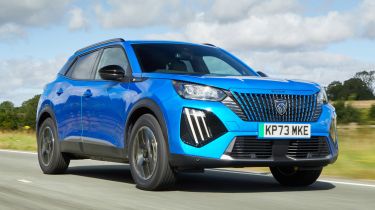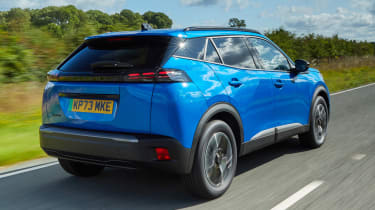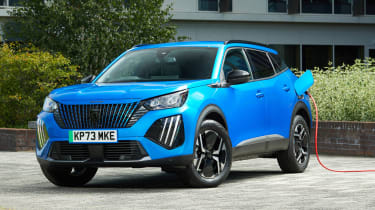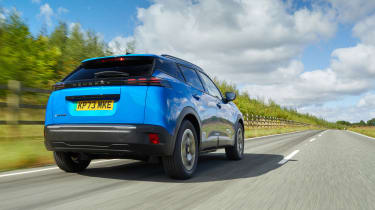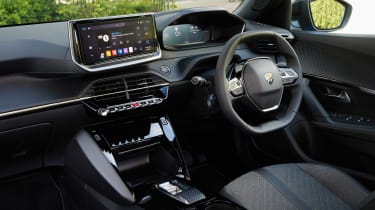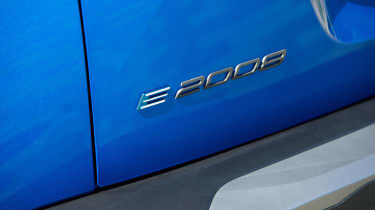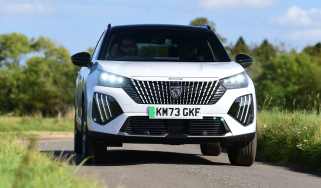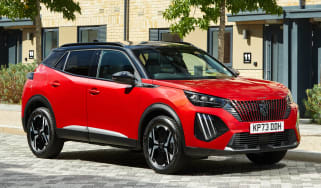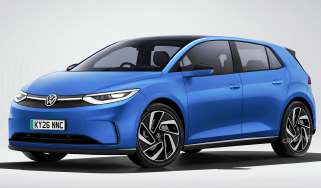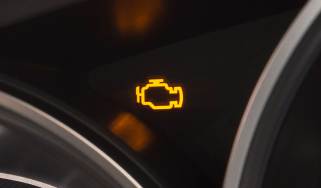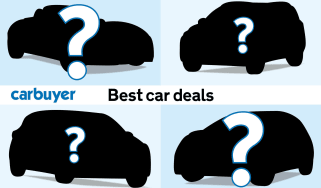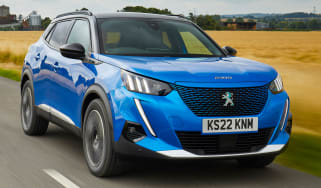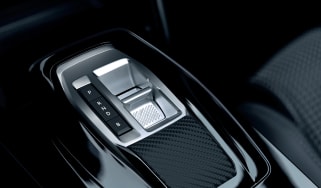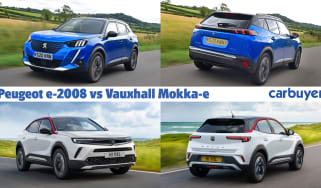Peugeot E-2008 SUV review
“Eye-catching inside and out, the Peugeot E-2008 has a decent electric range and is impressively smooth”
Pros
- Good value
- Fast-charging available
- Refined
Cons
- Heavy
- Shorter range than rivals
- Not as agile as petrol versions
Verdict - Is the Peugeot E-2008 a good car?
Peugeot has added to the growing collection of electric SUVs on the road with the E-2008, and the model has proved a hit with buyers. Fusing the striking looks of the fresh Peugeot 2008 SUV with an almost silent electric drivetrain, and no loss in practicality, it’s no surprise the E-2008 holds appeal. A mid-life facelift should only keep its sales bubbling away, especially as it’s now both faster and goes further between charges.
Peugeot E-2008 models, specs and alternatives
The Peugeot E-2008 is a small electric SUV that’s closely based on the Peugeot E-208 supermini, and even other models under the Stellantis umbrella like the Vauxhall Mokka Electric. Helping its appeal is a starting price putting the E-2008 on a par with rivals including the Hyundai Kona Electric, Kia Niro EV and the Citroen e-C4. You might even consider less well-known electric rivals such as the BYD Atto 3 – while you might not have heard of it, there’s no denying it’s a compelling alternative, with a lower list price and attractive finance options.
If you’re used to petrol and diesel cars, the E-2008 might still look comparatively expensive, but the upside is that recharging the battery costs much less than refilling a fuel tank. It’s free to tax until 2025 and sits in a low Benefit-in-Kind (BiK) band for business users.
 Top 10 best electric SUVs – the ones to buy in 2025
Top 10 best electric SUVs – the ones to buy in 2025
A facelift for mid-2023 also gave the E-2008 a significant boost, not only thanks to a makeover and Peugeot’s latest interior technology, but also the arrival of a new battery pack and electric motor. Advances in Peugeot’s EV know-how mean this improves both its range and performance.
More reviews
Car trim reviews
In-depth reviews
Used car reviews
It’s fair to say that you’ll be recharging the E-2008 more often than you’d refuel a petrol or diesel car, as Peugeot’s electric SUV offers up to 251 miles of range (206 miles before its facelift). That’s more than the entry-level Nissan Leaf or the MG ZS EV but it can’t match the impressive ranges of the Hyundai Kona Electric and Kia Niro EV.
One electric motor and a 54kWh battery provide 154bhp to the front wheels, and 0-62mph takes a sprightly nine seconds – that’s quicker than most other Peugeot 2008 models, and it feels smoother to drive as well.
One reason to choose the E-2008 over its rivals is the interior. There’s a 10-inch HD touchscreen fitted to some trim levels, which is impressive and easy to use, while the buttons grouped under the central air vents are styled like piano keys. These not only look good, but feel tactile too. Most of the materials feel upmarket, and higher trims get an exclusive grey Alcantara suede-like seat upholstery. You also get a digital instrument cluster, regardless of trim level, and, like all other new Peugeots, you look over the small steering wheel instead of through it. Not everyone gets on with this setup, so make sure you take a test drive to see if it suits you. An identical 434-litre boot to the standard Peugeot 2008 means there's no downgrade for practicality.
On the outside, only a handful of ‘e’ badges and a fared-in grille with body-coloured elements mark it out as something different to the petrol or diesel models. The charging port is located under the regular fuel filler door.
Recharging from 10-80% will take around half an hour using a 100kW DC fast charger, and around 7.5 hours from a 7.4kW charger.
Range, charging & running costs
The Peugeot E-2008 may be slightly more expensive to buy than similarly specced petrol or diesel models, but you’ll start to see the savings when recharging. It’ll cost less to top up the battery than to refill a fuel tank – particularly if you have a tariff with a cheap off-peak rate – and you can expect up to 251 miles between full charges, a sizeable 38-mile improvement on the pre-facelift E-2008. That’s about average for the latest electric cars, more than the smaller battery version of the Hyundai Kona Electric.
Recharging the 54kWh battery takes around 7.5 hours from a 7.4kW public charger or home wallbox. For under £400, you can spec the E-2008 with a quicker 11kW-capable system, but this type of charger requires a three-phase electrical supply. Find a 100kW fast-charger (most common on the UK’s motorway network) and recharging to 80% takes roughly half an hour.
There’s a MyPeugeot companion app you can download, and it lets you control a range of the car’s features from your smartphone. You can preset the climate control before you get in the car, remotely check the charging status and tell the charger when to start topping up the battery: you can schedule the time it starts for when the electricity is cheaper, at night, for example.
VED (road tax) is free, whether you’re a private or business customer. The warranty will match the petrol car’s three-year/60,000-mile cover, while Peugeot should offer fixed-price service plans that you can spread out in monthly payments. The E-2008 needs servicing every 16,000 miles or two years, compared to 12,500 miles or annually for petrol models.
Electric motor, drive & performance
All Peugeot E-2008 models came with a 134bhp electric motor at first, but this was upgraded to a new 154bhp motor as part of its mid-2023 facelift. Despite the increase in power, 0-62mph is still dealt with in around nine seconds.
Stepping into the driver’s seat of the E-2008, you’ll notice its tiny steering wheel and dials positioned above it. It’s become somewhat of a Peugeot trademark (called i-Cockpit), but it’s not for everyone – some people like it, while others might find it compromises their driving position, or that the top of the steering wheel blocks the instruments.
We recently drove the facelifted E-2008 on UK roads, and while its performance feels adequate in Normal driving mode, we much preferred leaving it in Sport mode as its throttle felt more natural and responsive. Only in this Sport setting does all its power become available, and it does make the E-2008 feel quite a bit livelier.
Nudge the gear lever into ‘B’ mode and regenerative braking kicks in, slowing the car when you come off the accelerator pedal and putting charge back into the battery. We found the regenerative braking tech on the E-2008 to provide only a weak braking effect compared to rivals, so it won’t appeal to you if you’re used to EVs with one-pedal driving or more sophisticated regen configuration settings, where you hardly have to use the brake pedal at all.
The latest E-2008 isn’t the most enjoyable car of its type to drive: it feels stable enough in corners, but there’s an oddly weighted, unnatural feel to the steering. The ride is firmer than we’d like, too, although it still feels more composed than rivals such as the Hyundai Kona.
Interior & comfort
While the Peugeot E-2008’s 2023 facelift brought revised exterior styling, such as the claw-like triple LED light signature, the interior is largely unchanged in terms of design, but that’s no bad thing.
Peugeot’s recent models have dashboard designs that are like no other car on the road, and the new Peugeot E-2008 is no different. You still look at the i-Cockpit digital instrument cluster (standard on all models) over – rather than through – the steering wheel. We found it was easy to read and offered a good level of customisation allowing you to choose what information is displayed. GT versions get a 3D display, and the instrument panel’s graphics and colours can be tweaked to suit your preference – it feels like somewhat of an unnecessary gimmick that we could live without, however.
There’s a much more upmarket feel to the latest 2008. Soft-touch materials cover more of the interior, and the physical buttons on the centre console are styled to look like piano keys. They feel like they could easily be from a more expensive car, though we’d like it if more of these physical keys could be used for the climate controls. while contrast stitching is offered and gives the interior a lift. Above them sits a sleek high-definition 10-inch screen that’s now standard.
The E-2008 is well-equipped across the board, with the trim lineup kicking off with the Active model. All models come with wireless smartphone connectivity, air conditioning, rear parking sensors, LED headlights and automatic lights and wipers.
Allure brings unusual ‘Karakoy’ diamond-cut alloy wheels which give a unique look – despite being larger 17-inch wheels, we found they didn’t hurt ride quality too badly when fitted to our test car. There’s also a ‘head-up instrument panel’, front parking sensors and black roof rails, as well as Apple CarPlay and Android Auto compatibility among other features. We’d recommend this trim for the majority of buyers as it has everything most would need, but if you’re looking for a bigger tech offering, you might consider going for the top-spec GT.
GT adds features like a 3D instrument panel, a smartphone charging pad and 180-degree rear-view camera. There’s also part-leather upholstery with bright contrast stitching in these models – a small touch that does a lot to liven up what can be quite a dark cabin. There’s also a First Edition E-2008, with Alcantara upholstery, massaging and heated front seats, upgraded navigation and an 11kW on-board charger.
Practicality & boot space
Owning an electric car can involve sacrificing some of the practicality of the equivalent petrol or diesel model, as the battery packs usually take up space under the boot floor. The latest Peugeot 2008 was designed to have petrol, diesel and electric powertrains from the start, so there’s no less space in the E-2008.
The car’s wheelbase (the distance between the front and rear wheels) is 60mm longer than that of the Peugeot 208, and legroom is much better as a result. Headroom is also decent, and rear-seat passengers can slide their feet quite far under the front seats.
Boot space is good at 434 litres, opening up to 1,476 litres when the rear seats are folded flat. This compares favourably to the SEAT Arona, although some rivals such as the Renault Captur and Citroen C3 Aircross offer more load space because they have a rear bench that you can slide forwards. If boot space practicality is a priority, it also beats electric rivals such as the BYD Atto 3, although the Atto 3 does offer more space for rear passengers.
The Peugeot E-2008 makes do with a tyre repair kit instead of a space-saver spare wheel, but there is space under the boot floor to store the charging cable. It’s worth noting that if you want to charge from a standard three-pin home socket, you’ll need a different cable that’s not included as standard.
Reliability & safety
Although the electric E-2008 has not been tested by Euro NCAP, the petrol-powered pre-facelift Peugeot 2008 was in 2019 and achieved four stars. It achieved its worst scores in the Vulnerable Road Users and Safety Assist tech categories, and gets five stars with the extra safety tech fitted. Since then, though, much more of this is standard, with all E-2008s getting features such as lane-keeping assistance, speed limit recognition, plenty of airbags and emergency braking assistance with pedestrian detection. The top-spec GT model also has adaptive cruise control, lane-positioning assist and blind-spot monitoring.
Peugeot performed very well in our 2023 Driver Power owner satisfaction survey, coming ninth out of 32 brands, and finishing ahead of rivals including Toyota (12th), Skoda (20th) and Volkswagen (27th). The 2008 SUV finished 53rd out of the 75 cars on the list, with a below-average score for reliability and build quality, along with a poor 55th place for interior storage, which indicates there’s not as much space as its SUV looks would have you believe. A reasonably low 19% of respondents reported a reliability issue in the first year of ownership.
Which Is Best?
Cheapest
- Name100kW Allure 50kWh 5dr Auto
- Gearbox typeAuto
- RRP£34,400
Most Economical
- Name115kW Allure 54kWh 5dr Auto
- Gearbox typeAuto
- RRP£35,200
Fastest
- Name100kW Allure 50kWh 5dr Auto
- Gearbox typeAuto
- RRP£34,400
